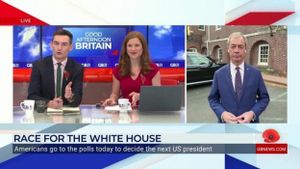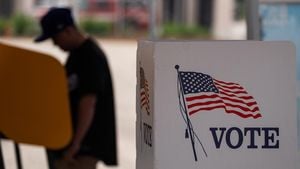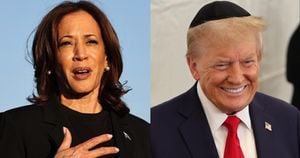Just two weeks before the monumental Election Day, the political stage is heating up with intense rhetoric, especially concerning former President Donald Trump. John Kelly, Trump’s former chief of staff and retired Marine General, recently made headlines after he publicly labeled Trump as fitting the definition of "fascist" during interviews with The New York Times. This bold declaration signals deepening divides within the Republican party as the election approaches.
Kelly, who once held one of the highest-ranking positions within the Trump administration, had been relatively quiet about his tenure until this pivotal moment. He decided to step forward, reportedly motivated by Trump’s alarming remarks about using the military against perceived political adversaries, referred to ominously by Trump as the "enemy within." According to Kelly, such statements are not merely politically charged; they strike at the very heart of American democratic principles.
"I think this issue of using the military on—to go after—American citizens is one of those things I think is very, very bad..." Kelly stated. He emphasized how damaging it is to even suggest such actions for electoral gain. His reflections come as the nation stands at the brink of another potential Trump presidency, prompting grave concerns from former officials.
But what exactly did Kelly mean by calling Trump fascist? He referenced the core attributes of fascism—including authoritarianism, ultranationalism, and the suppression of dissent—suggesting Trump's governance style aligns unsettlingly with these traits. "Looking at the definition of fascism... certainly, from my experience, those are the kinds of things he thinks would work," asserted Kelly.
Trump has made notable comments during his reign and post-presidency, often expressing admiration for autocrats and dictators, including figures like Vladimir Putin and Kim Jong Un. His accolades toward these leaders have not only raised eyebrows but have prompted serious discussions about his attitude toward authority and governance. Last month, Kelly conveyed shock at Trump's reported admiration for Adolf Hitler, recalling how Trump allegedly remarked, "You know, Hitler did some good things, too." Kelly felt compelled to confront Trump directly about such statements, advising him to avoid sharing such controversial opinions.
The fallout from these statements is substantial. The Trump campaign quickly fired back, labeling Kelly as untrustworthy and implying he had fabricated stories stemming from his time at the White House. Spokesperson Steven Cheung claimed, "John Kelly has totally beclowned himself with these debunked stories... He has a debilitating case of Trump Derangement Syndrome." This defensive move reflects the precarious balance Trump’s campaign is trying to maintain as they fend off criticism from both former aides and public figures.
Vice President Kamala Harris has seized the opportunity to amplify Kelly’s remarks, positioning them as validation of her campaign's core message—that Trump's potential re-election could pose severe risks to democracy. At various campaign rallies, including one notable event featuring military leaders, Harris cautioned voters against the dangers of another Trump presidency. She pointedly referred to Kelly's comments, stating, "Donald Trump is increasingly unhinged and unstable," framing his communication style and leadership as dangerous.
The national discourse surrounding Trump has persisted since his initial run for office, but remarks from military figures and previous administration officials seem to carry more weight as Election Day nears. The bipartisan concern about Trump's appropriateness for the presidency brings mixed reactions from the Republican base. While there are those who echo Kelly's sentiments and resonate with the call for caution, others remain unwavering supporters of Trump, dismissing the dissent as mere political maneuvering.
Polling indicates tight races across battleground states, with both Harris and Trump making concerted efforts to win over undecided voters. Pollster Robert Blizzard remarked, "It’s hard to believe this is going to be the 'ah, gotcha now' moment for Democrats," indicating skepticism about the impact Kelly’s comments might have on Trump’s core supporters.
The narrative surrounding Trump continues to evolve amid stark warnings from those who once served alongside him. Figures like former Defense Secretary Mark Esper have echoed similar concerns, expressing apprehension over Trump’s potential to misuse military power. Esper has warned about Trump's inclination to employ the military against domestic critics, which draws stark contrasts to traditional views on military involvement.
Another layer of complexity arises as various former officials have endorsingly turned toward Harris, urging the public to recognize the headwinds of unchecked authoritarianism. For example, their collective warnings suggest the need for vigilance as America approaches the polls. Yet as some Republicans voice their backing for Harris, others contend such endorsements will not persuade the long-standing Trump loyalists who form the bedrock of his support.
The upcoming election promises to be one of the most momentous political showdowns of recent history, showcasing not only candidate policies but also the character and rationale behind their leadership styles. Just as uncertain is the ultimate impression Kelly’s accusations will leave on voters, who remain divided as the clock ticks down to November 5. The stakes appear to be extraordinarily high as Trump’s supporters and detractors brace for what promises to be a contentious election season.
With the election imminent, it is clear the confrontation surrounding Trump and his previous associates will likely shape voter sentiments. Whether Kelly’s statements will impact undecided voters remains one of the largest question marks. One thing is clear: as past and present officials engage publicly, the tone and atmosphere surrounding this discussion of power and governance will continue to resonate throughout the nation far beyond Election Day.



